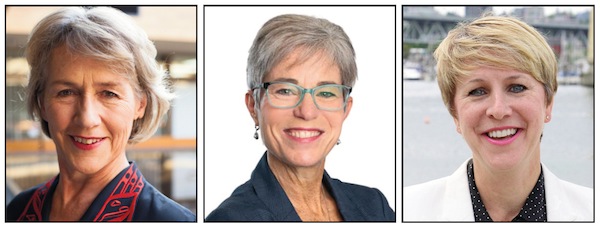Left to right: MP Joyce Murray, MLA Selina Robinson and Vancouver Councilor Sarah Kirby-Yung spoke at a June 3 webinar hosted by the Canadian Jewish Political Affairs Committee. (photos from the internet)
“Intense” was the word used by speakers from all levels of government to describe their experiences during the pandemic emergency.
In a June 3 webinar on Zoom, federal and provincial cabinet ministers and a Vancouver city councilor addressed COVID-19: What’s the New Normal? The event was hosted by the Canadian Jewish Political Affairs Committee.
Joyce Murray, member of Parliament for Vancouver-Quadra, is Canada’s minister of digital government, a role that took on sudden significance when even Parliament began operating virtually and almost all federal civil servants are being asked to work from home.
“It’s been an incredibly intense time,” she said. “I never thought I would work harder than I do as a minister in Ottawa, but I would say these last few months have been much more intense than I expected.”
A million Canadians were able to apply for the Canada Emergency Response Benefit (CERB) on the first day, which Murray said illustrates the scope and speed of the government’s electronic mobilization.
Responding to a question from an audience member, she acknowledged that there may be some inequities in the program – some people are earning more not working than a neighbour might earn on the job – but the decision was made to ramp up immediately, knowing that anomalies were likely.
The federal government has not decided when to reopen the U.S. border, Murray said. The current, extended closure ends June 21.
“Our primary focus is the safety of Canadians,” she said. “We’ll be taking the advice of public health officials and thinking about all of the different ramifications and make a decision when the time comes.”
The discussion was moderated by James Moore, a former Conservative MP, who pressed Murray on the unanticipated federal expenditures resulting from the pandemic.
“Fortunately, Canada entered this in a very strong fiscal position compared with most of its G-20 partners,” she responded. “So we were ready and able to respond and there is now approximately $150 billion in direct support to Canadians that has been put on the table. That makes it one of the most ambitious response plans in the world. But our view is that we had fiscal firepower, it was right to use it and it will help our economy emerge more quickly and more strongly when the pandemic allows us to do that safely. Our focus right now is on helping Canadians and getting that right.… We will return to a strong fiscal position when it’s time.”
Selina Robinson, British Columbia’s minister of municipal affairs and housing, noted that the provincial government stepped up with $5 billion in emergency funding.
“It would be very, very hard coming out of this if we had people who were evicted from their homes and couldn’t put food on the table,” said Robinson, who is MLA for Coquitlam-Maillardville. “I think everybody agrees that we needed to invest in people, so that they can continue to feed their families.”
Provincial Health Officer Dr. Bonnie Henry has warned that no pandemic in history has not had a second wave. Robinson said British Columbia and other jurisdictions are ready for that potential.
“I think we’re far better prepared for any future waves, given the experience we’ve had over the last few months,” she said.
Murray lamented the sharp rise in anti-Asian hate crimes, while Moore warned that U.S. President Donald Trump “is going to run for reelection against China, and not against Joe Biden” – he fears the repercussions for Asian communities in North America as a result.
Robinson said the Jewish community is uniquely placed to be allies to those affected by this phenomenon, as well as to racialized individuals during the parallel upheavals around race, police violence and Black Lives Matter.
“I’m really proud to be part of the Jewish community and knowing that our history as a Jewish community has historically stood up for these values, to make sure that there is space for everyone and for standing up when we see injustice,” she said. “We will continue to do that and I urge everybody who is participating to make sure that you use your voice however and wherever you can.”
Sarah Kirby-Yung, a Vancouver city councilor, also spoke from a personal perspective, noting that her immediate family is of Asian descent.
“I’m incredibly distressed when I hear from members of the Asian community, seniors and vulnerable people particularly, who are afraid to leave their home or go for groceries or are changing their pattern because of who they are,” she said.
Vancouver’s budget has taken a swift kick during the pandemic, but Kirby-Yung rejected the rumour that the city is approaching bankruptcy.
“We are looking at about a $150 to $200 million projected revenue gap for Vancouver through the end of 2020,” she said. “Vancouver is not going bankrupt. We are in reasonable shape, but it doesn’t mean that we don’t have to be very thoughtful about our spending in our decisions.”

